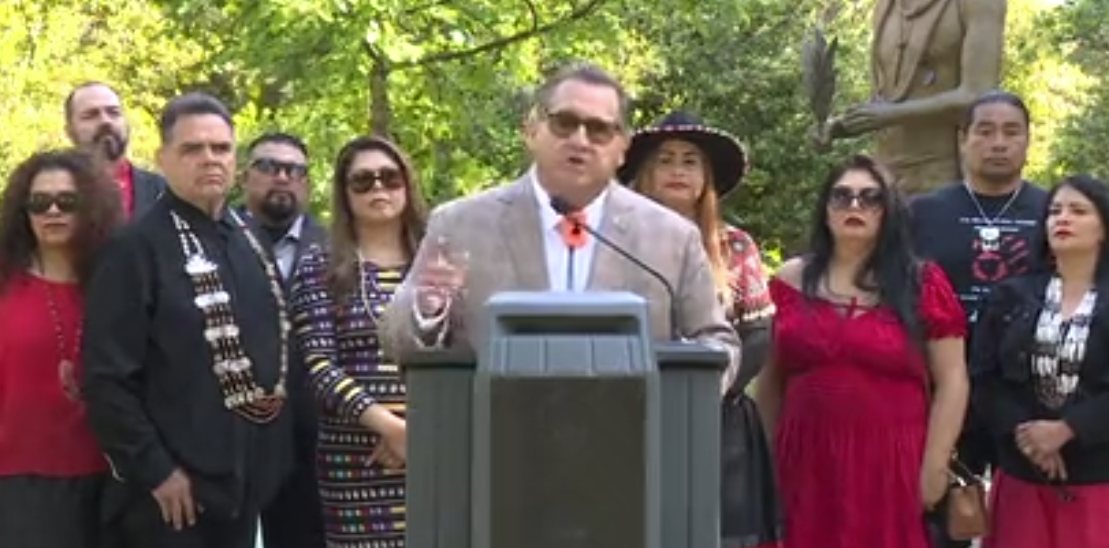
- Details
- By Native News Online Staff
Tribal leaders, lawmakers from both parties, and advocates gathered at the California State Capitol today to honor Missing and Murdered Indigenous People (MMIP) and to recommit to ending violence on tribal lands. The daylong series of events included a hearing of the Select Committee on Native American Affairs and will conclude with a powerful evening vigil featuring cultural songs, speeches from victims' families, and a video message from First Partner Jennifer Siebel Newsom.
Assemblymember James C. Ramos (D-San Bernardino), chair of the California Legislative Native American Caucus, emphasized the urgency of the crisis: “California ranks among the worst in the nation for unresolved and uninvestigated MMIP cases. According to the National Congress of American Indians and the National Institute of Justice, more than 84% of Native American women have experienced violence in their lifetimes. This level of trauma is unacceptable.”
Two California tribes—the Yurok Tribe and the Coyote Valley Band of Pomo Indians—have declared states of emergency in recent years due to the high number of missing persons. The Yurok Tribe made their declaration in December 2021, while Coyote Valley followed on April 25, 2024.
Data from the National Institute of Justice reveal that:
-
56% of Native women have experienced sexual violence,
-
75% of those affected endure such violence more than once.
In 2016, the National Crime Information Center recorded 5,712 missing Native American and Alaska Native women and girls in the U.S., yet only 116 cases were entered into the National Missing and Unidentified Persons System.
At the morning press conference, Ramos led a hearing to address the challenges tribal communities face in protecting their members. A key issue discussed was the impact of Public Law 280, a 1953 federal statute that shifted criminal justice responsibility to six states, including California. Ramos noted that the law has created jurisdictional confusion and undercut public safety. “Cities and counties have fewer law enforcement partners to rely on when emergencies arise,” he said. “And these six states consistently report the highest numbers of unresolved MMIP cases.”
The hearing featured testimony from tribal leaders and public safety officials, including:
-
Chairperson Antoinette Del Rio (California Valley Miwok Indians)
-
Chairperson Cheyenne Stone (Big Pine Paiute Tribe of the Owens Valley)
-
Chairperson Charles Martin (Morongo Band of Mission Indians)
-
Chairman Joe James (Yurok Tribe)
-
Professor Carole Goldberg (UCLA School of Law)
-
Acting Director Isaac Borjorquez (Office of Attorney General Rob Bonta)
-
Humboldt County Sheriff William Honsal
-
San Bernardino County Sheriff Shannon Dicus
-
Cahuilla Councilwoman Samantha Thornsberry
-
April McGill (Yuki, Wappo), American Indian Cultural Center of San Francisco
-
Virginia Hedrick (Yurok Tribe member, Karuk descendant), California Consortium for Urban Indian Health
The day will culminate in a candlelight vigil on the Capitol grounds, where the dome will glow red in solidarity. Hundreds are expected to gather for the emotional event, honoring the lives lost and standing together in a call for justice and systemic change.
Editor's Note: This story has been updated to reflect April McGill's correct affiliation with the American Indian Cultural Center of San Francisco and to add Virginia Hedrick of the California Consortium for Urban Indian Health, who was also present at the event.
More Stories Like This
Native News Weekly (August 25, 2024): D.C. BriefsUS Presidents in Their Own Words Concerning American Indians
Indigenous Actor Elaine Miles Reports Detention by Alleged ICE Agents
Happy Thanksgiving from Native News Online
Coming Up on Native Bidaské: Behind the Animation: Joey Clift Talks “Pow” and Native Storytelling
Help us tell the stories that could save Native languages and food traditions
At a critical moment for Indian Country, Native News Online is embarking on our most ambitious reporting project yet: "Cultivating Culture," a three-year investigation into two forces shaping Native community survival—food sovereignty and language revitalization.
The devastating impact of COVID-19 accelerated the loss of Native elders and with them, irreplaceable cultural knowledge. Yet across tribal communities, innovative leaders are fighting back, reclaiming traditional food systems and breathing new life into Native languages. These aren't just cultural preservation efforts—they're powerful pathways to community health, healing, and resilience.
Our dedicated reporting team will spend three years documenting these stories through on-the-ground reporting in 18 tribal communities, producing over 200 in-depth stories, 18 podcast episodes, and multimedia content that amplifies Indigenous voices. We'll show policymakers, funders, and allies how cultural restoration directly impacts physical and mental wellness while celebrating successful models of sovereignty and self-determination.
This isn't corporate media parachuting into Indian Country for a quick story. This is sustained, relationship-based journalism by Native reporters who understand these communities. It's "Warrior Journalism"—fearless reporting that serves the 5.5 million readers who depend on us for news that mainstream media often ignores.
We need your help right now. While we've secured partial funding, we're still $450,000 short of our three-year budget. Our immediate goal is $25,000 this month to keep this critical work moving forward—funding reporter salaries, travel to remote communities, photography, and the deep reporting these stories deserve.
Every dollar directly supports Indigenous journalists telling Indigenous stories. Whether it's $5 or $50, your contribution ensures these vital narratives of resilience, innovation, and hope don't disappear into silence.
 The stakes couldn't be higher. Native languages are being lost at an alarming rate. Food insecurity plagues many tribal communities. But solutions are emerging, and these stories need to be told.
The stakes couldn't be higher. Native languages are being lost at an alarming rate. Food insecurity plagues many tribal communities. But solutions are emerging, and these stories need to be told.
Support independent Native journalism. Fund the stories that matter.
Levi Rickert (Potawatomi), Editor & Publisher

